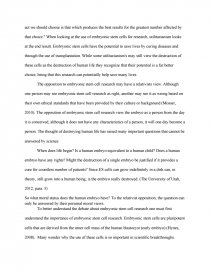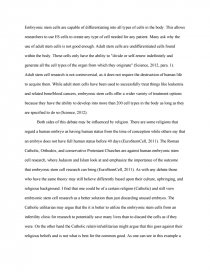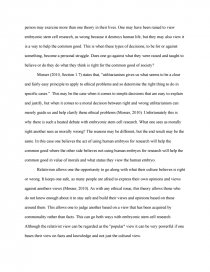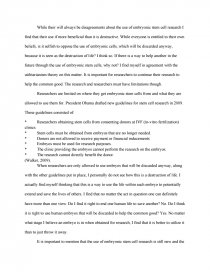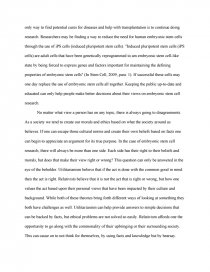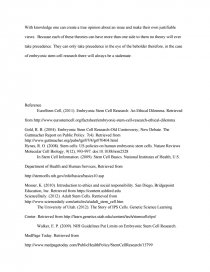Soc120: Introduction to Ethics & Social Responsibility
Essay by jimart4694 • January 3, 2013 • Research Paper • 2,173 Words (9 Pages) • 1,565 Views
Essay Preview: Soc120: Introduction to Ethics & Social Responsibility
Stalemate
Jillian Martinez
SOC120: Introduction to Ethics & Social Responsibility
Ashley Arends
September 10, 2012
Stalemate
Scientific research has come a long way since the first use of human embryos to treat and prevent diseases. The polio vaccine was invented in the 1950's from the use of human fetal kidney cells, fetuses in uteri were used to develop techniques like amniocenteses and improving knowledge about congenital heart disease in the 1970's, and in the 1980's the transplantation of fetal tissue into adults to help with serious conditions like, diabetes or Parkinson's (Gold, 2004). While there has always been concern and controversy over the use of human embryonic cells, today the debate is ethical. This ethical debate lies within the destruction of human embryos in order to use them for medical research. This paper will talk about how two different theories; utilitarianism and relativism view this ethical issue and the problem it presents, as well as my personal views on use of embryonic stem cell research.
The theory of utilitarianism determines what is best by looking at the results of an act. According to Mosser (2010, section 1.7), "utilitarianism argues that, given a set of choices, the act we should choose is that which produces the best results for the greatest number affected by that choice." When looking at the use of embryonic stem cells for research, utilitarianism looks at the end result. Embryonic stem cells have the potential to save lives by curing diseases and through the use of transplantation. While some utilitarianism's may still view the destruction of these cells as the destruction of human life they recognize that their potential is a far better choice, being that this research can potentially help save many lives.
The opposition to embryonic stem cell research may have a relativists view. Although one person may see embryonic stem cell research as right, another may see it as wrong based on their own ethical standards that have been provided by their culture or background (Mosser, 2010). The opposition of embryonic stem cell research view the embryo as a person from the day it is conceived, although it does not have any characteristics of a person, it will one day become a person. The thought of destroying human life has raised many important questions that cannot be answered by science.
When does life begin? Is a human embryo equivalent to a human child? Does a human embryo have any rights? Might the destruction of a single embryo be justified if it provides a cure for countless number of patients? Since ES cells can grow indefinitely in a dish can, in theory, still grow into a human being, is the embryo really destroyed. (The University of Utah, 2012, para. 5)
So what moral status does the human embryo have? To the relativist opposition, the question can only be answered by their personal moral views.
To better understand the debate about embryonic stem cell research one must first understand the importance of embryonic stem cell research. Embryonic stem cells are pluripotent cells that are derived from the inner cell mass of the human blastocyst (early embryo) (Hynes, 2008). Many wonder why the use of these cells is so important in scientific breakthroughs. Embryonic stem cells are capable of differentiating into all types of cells in the body. This allows researchers to use ES cells to create any type of cell needed for any patient. Many ask why the use of adult stem cells is not good enough. Adult stem cells are undifferentiated cells found within the body. These cells only have the ability to "divide or self-renew indefinitely and generate all the cell types of the organ from which they originate" (Science, 2012, para. 1). Adult stem cell research is not controversial, as it does not require the destruction of human life to acquire them. While adult stem cells have been used to successfully treat things like leukemia and related bone/blood cancers, embryonic stem cells offer a wider variety of treatment options because they have the ability to develop into more than 200 cell types in the body as long as they are specified to do so (Science, 2012).
Both sides of this debate may be influenced by religion. There are some religions that regard a human embryo as having human status from the time of conception while others say that an embryo does not have full human status before 40 days (EuroStemCell, 2011). The Roman Catholic, Orthodox, and conservative Protestant Churches are against human embryonic stem cell research, where Judaism and Islam look at and emphasize the importance of the outcome that embryonic stem cell research can bring (EuroStemCell, 2011). As with any debate those who have the same theory may still believe differently based upon their culture, upbringing, and religious background. I find that one could be of a certain religion (Catholic) and still view embryonic stem cell research as a better solution than just discarding unused embryos. The Catholic utilitarian may argue that the it is better to utilize the embryonic stem cells from an infertility clinic for research to potentially save many lives than to discard the cells as if they were. On the other hand the Catholic relativist/utilitarian might argue that this goes against their religious beliefs and is not what is best for the common good. As one can see in this example a person may exercise more than one theory in their lives. One may have been raised to view embryonic stem cell research, as wrong because it destroys human life, but they may also view it is a way to help the common good. This is when these types of decisions, to be for or against something, become a personal struggle. Does one go against what they were raised and taught to believe or do they do what they think is right for the common good of society?
Mosser (2010, Section 1.7) states that, "utilitarianism gives us what seems to be a clear and fairly easy principle to apply to ethical problems and so determine the right thing to do in specific cases." This may be the case when it comes to simple decisions that are easy to explain and justify, but when it comes to a moral decision between right and wrong utilitarianism can merely guide us and help clarify these ethical problems (Mosser, 2010). Unfortunately this is why there is such a heated debate with embryonic stem cell research. What one sees as morally right another sees as morally wrong? The reasons may be different, but the end result may be the same.
...
...

